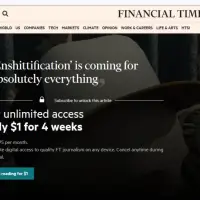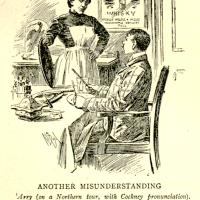 Nearly two decades after the work that secured his fame as a public Christian intellectual, C.S. Lewis wrote a follow up to The Screwtape Letters. Lewis never thought Screwtape was worth the fuss, and he struggled to write from the demonic perspective in the original WWII-era Letters. It wasn’t until 1959, nearly twenty years later, that he agreed to finally write a follow up for The Saturday Evening Post.
Nearly two decades after the work that secured his fame as a public Christian intellectual, C.S. Lewis wrote a follow up to The Screwtape Letters. Lewis never thought Screwtape was worth the fuss, and he struggled to write from the demonic perspective in the original WWII-era Letters. It wasn’t until 1959, nearly twenty years later, that he agreed to finally write a follow up for The Saturday Evening Post.
The setting of the two eras is quite different. In 1941, Lewis is just past 40. He is a new voice in the public conversation and a rising star of Christian book writing. He knows he has the stuff to write popularly, translating his ideas so that they were accessible to most. By 1959, when Lewis was 60, he described himself as a dinosaur. He had written most of his best work, and though he had fallen in love and married, his wife was quite ill. Lewis was a different man twenty years later.
The context of the Letters is also different. The original Letters were written to war-time Britain, to a post-Christian culture still filled with nominal or cultural Christians. The world had teeth. It was a dangerous place to live, and ideology made a difference in real life. Technology had turned its ugly face to war, and one of the world’s greatest democracies had betrayed the rest.
 In 1959, Lewis chose to write to an American audience. America in 1959 is on the edge of a new decade. 1950s U.S. had the greatest family and economic growth of its history. It is a generation with the victory of WWII in their experience, but a less firm sense of victory in Southeast Asia–which will soon become the highly contested Vietnam War. The Cold War is heightening, the Cuba Missile Crisis is around the corner, and the Dalai Lama and thousands of Tibetans are on the run from Chairman Mao’s China. America has just elected a young Roman Catholic visionary who will promise to beat Russia to the moon. The Beatles are practicing their music, ready to drop their first record in 1960 and change the world on Ed Sullivan in 1964. Racial integration, Martin Luther King Jr., Frank Sinatra, Ben Hur—the time was right for some of the best times in one of the strongest countries of the world.
In 1959, Lewis chose to write to an American audience. America in 1959 is on the edge of a new decade. 1950s U.S. had the greatest family and economic growth of its history. It is a generation with the victory of WWII in their experience, but a less firm sense of victory in Southeast Asia–which will soon become the highly contested Vietnam War. The Cold War is heightening, the Cuba Missile Crisis is around the corner, and the Dalai Lama and thousands of Tibetans are on the run from Chairman Mao’s China. America has just elected a young Roman Catholic visionary who will promise to beat Russia to the moon. The Beatles are practicing their music, ready to drop their first record in 1960 and change the world on Ed Sullivan in 1964. Racial integration, Martin Luther King Jr., Frank Sinatra, Ben Hur—the time was right for some of the best times in one of the strongest countries of the world.
Yet, even given his distance and the fact that he was a “dinosaur,” Lewis could see the potential for a downward turn for America. He tackles two things in this follow up to Screwtape–education and individualism–showing how the word “democracy” could be twisted to rob people of individuality, ingenuity, and spiritual strength.
 The genre this time changes a little. We have in 1959 a toast at a graduation banquet rather than a letter. More than the original Screwtape Letters, perhaps, the Toast is an incisive public critique of education, social politics, and cultural shifts in worldview. I also think Screwtape Proposes a Toast gives us another angle to Lewis’ The Abolition of Man: the world behind Screwtape’s speech in 1959 is really the dystopia of “Men Without Chests.” It is a critique that is still relevant today, and possibly prophetic, at least for those who have ears to hear.
The genre this time changes a little. We have in 1959 a toast at a graduation banquet rather than a letter. More than the original Screwtape Letters, perhaps, the Toast is an incisive public critique of education, social politics, and cultural shifts in worldview. I also think Screwtape Proposes a Toast gives us another angle to Lewis’ The Abolition of Man: the world behind Screwtape’s speech in 1959 is really the dystopia of “Men Without Chests.” It is a critique that is still relevant today, and possibly prophetic, at least for those who have ears to hear.
Although the Toast has been circulating online for some time, The Saturday Evening Post has chosen to release it to the public on their website. What the SEP release does is to allow us to see the letter in the magazine (the PDF is essentially a photocopy) in its original layout with a giant mug shot of Sir Lewis, as well as a poem and a cartoon that seem remarkably out of place. It is well worth a peek.
Quite recently, I was interviewed by William O’Flaherty of the All About Jack podcast. William’s podcast is the premier social conversation media for C.S. Lewis and the Inklings, and it is a pleasure to be included. Make sure to check it out here and share it on social media. Below I’ve included some outline notes and some of my favourite quotes from “the Toast.”
Outline of “Screwtape Proposes a Toast”
- Greetings
- Despite the lack of high quality “food”—human souls—there is a lot of it.
- 3 Characters:
- Corrupt politician
- Adulterers
- Trade Union leader
- Risk: Raise a human to the point of clear evil, but not too high that s/he recognizes it as evil and thus does good
- Limbo: “creatures suitable neither for Heaven nor for Hell” “consciousness hardly exists apart from the social atmosphere that surrounds them”
- 3 Morals:
- Quantity of souls
- The highest quality of tempters
- The low quality of sinners is good news: poor fare for us, but utter frustration for the Enemy
- 3 Characters:
- Latter half of the 19th century:
- Were not able to take advantage of the great gains of the 19th
- The structures of anti-Christianity remained, but Christian Socialism was making things better
- Counterattack
- Deep hatred of personal freedom
- “Democracy” changes in form
- Twisting “Democracy” to Demonic Ends
- Step 1: Democratic = “I’m as good as you” à “special”
- Step 2: Then, every mere difference is a claim to superiority (old name: Envy)
- Step 3: Tall Poppy Syndrome: the elimination of every kind of human excellence – moral, cultural, social, or intellectual
- (byproduct: a small, useless intelligentia)
- Step 4: Return to the idea of Democracy: Tyrants need not clip off the top of the poppy—the small poppies will do it, then the large poppies will do it to themselves
- Turn this Lesson to Education in America (Make it like England): “I’m as good as you”
- Step 1: Make sure that children never feel they are inferior. Self-esteem is the most important thing.
- Step 2: Change curriculum to match the lowest level of student.
- Step 3: Tie all the bright students to the lowest students. à Ken Robinson
- = The virtual Abolition of Education
- = The loss of innovation in science and culture
- Links to the removal of the middle class in England
- Return to Democracy
- Demons would love the disappearance of real democracy. But since it exists, it must be undermined by “I’m as good as you.”
- “For “democracy” or the “democratic spirit” (diabolical sense) leads to a nation without great men, a nation mainly of subliterates, full of the cocksureness which flattery breeds on ignorance, and quick to snarl or whimper at the first sign of criticism”
- While it would be fun to destroy the freedom of free people, the real end is the individual in hell.
- Toast: The Pharisee is in Stock!
Some Great Quotes
On Grace vs. Law: “Hell expects and demands that it should be — as mine was — one of unbroken success. If it is not, you know what awaits you.”
On Humanity: “How often you will envy the humans their faculty of sleep!”
Adultery: “They all tasted to me like undersexed morons who had blundered or trickled into the wrong beds in automatic response to sexy advertisements, or to make themselves feel modern and emancipated, or to reassure themselves about their virility or their “normalcy,” or even because they had nothing else to do.”
On Conformity: “how should a jelly not conform?”
On Apathy: “Is the dullness of your present fare not a very small price to pay for the delicious knowledge that His whole great experiment is petering out?”
On Freedom: “I heard the other day that in that country a man could not, without a permit, cut down his own tree with his own axe, make it into planks with his own saw, and use the planks to build a toolshed in his own garden.”
On Twisting Words: “Democracy is the word with which you must lead them by the nose. The good work which our philological experts have already done in the corruption of human language makes it unnecessary to warn you that they should never be allowed to give this word a clear and definable meaning.”
On Equality: “No man who says I’m as good as you believes it. He would not say it if he did.”
On Equality & Democracy in Culture: “Under the influence of this incantation those who are in any or every way inferior can labour more wholeheartedly and successfully than ever before to pull down everyone else to their own level.”
On Individuality: “They might (horror of horrors!) become individuals.”
On Strategy: “It is in some ways more troublesome to track and swat an evasive wasp than to shoot, at close range, a wild elephant. But the elephant is more troublesome if you miss.”
On the Death of Civilization: “For “democracy” or the “democratic spirit” (diabolical sense) leads to a nation without great men, a nation mainly of subliterates, full of the cocksureness which flattery breeds on ignorance, and quick to snarl or whimper at the first sign of criticism”
On the Tall Poppy Syndrome: “If the whole tendency of their society is opposed to every sort of excellence, why did they expect their scientists to excel?”
On the Tall Poppy Syndrome: “I’m as good as you is a useful means for the destruction of democratic societies. But it has a far deeper value as an end in itself, as a state of mind which, necessarily excluding humility, charity, contentment, and all the pleasures of gratitude or admiration, turns a human being away from almost every road which might finally lead him to Heaven.”
On Destroying Democracy: “It is our function to encourage the behaviour, the manners, the whole attitude of mind, which democracies naturally like and enjoy, because these are the very things which, if unchecked, will destroy democracy. You would almost wonder that even humans don’t see it themselves”
On Religion and Spirituality: “it will be an ill day for us if what most humans mean by “Religion” ever vanishes from the Earth”. It can still send us the truly delicious sins. The fine flower of unholiness can only grow in the close neighbourhood of the holy. Nowhere do we tempt so successfully as on the very steps of the altar.”






















Oops, SEP: “professor of Medieval and Renaissance English Literature at Oxford” (photo caption, p. 36)! Thanks for bringing the online release to our (my, anyway!) attention, and for reflecting on it in context and highlighting its riches!
If you will indulge a sort of tangent, cross-referencing your Great Divorce series… As you succinctly put it, “In 1941, Lewis is just past 40. He is a new voice in the public conversation, and a rising star of Christian book writing.” Rereading (thanks to your series) The Great Divorce, I was struck by a sense of how high in the firmament that star was, those couple of years later, delicately accented in chapter 9 by the phrase beginning the paragraph after that in which MacDonald says, “There have been some who were so occupied in spreading Christianity that they never gave a thought to Christ”, where Lewis says, “Moved by a desire to change the subject”…
I was also struck by a way in which The Great Divorce complements The Screwtape Letters. Where it is only in the penultimate paragraph of the last letter we read “As he saw you, he also saw Them”, the third chapter of The Great Divorce ends with a paragraph announcing “I saw people coming to meet us”, to be followed throughout by conscious conversational interaction with “the Bright People”, though I think it is not until chapter 11 that we meet a speaker “more or less human in shape but larger than a man”. (Indeed, it it interesting to compare the matter of the last three paragraphs of Screwtape with that of The Great Divorce as a whole.)
Now, to reread “Screwtape Proposes a Toast”, next… (Curious that, while almost immediately republished in book form in The World’s Last Night and other essays in the U.S. (1960), it was yet another five years before it so appeared – for the first time readily-accessibly – in the U.K., in Screwtape Proposes a Toast and other pieces (1965).)
There is also a “Doctor Lewis” reference–one he wouldn’t use, despite the honourary doctorate. Well caught!
You’ve mentioned that ch. 9 a couple of times. I’m working on an idea about Lewis’ shift to self-analysis as a method of theological reflection.
The Great Divorce is the stage play of The Screwtape Letters. Both work out the principles of Problem of Pain (highlighted here and there in the Broadcasts). I’ve spent some time linking it all in outline, but it is actually the new space my PhD thesis is taking.
“Them” is a frightening word!
I hadn’t thought through the publishing history. Lewis was working cogently with publishers on the 1960 essay book, and wrote the preface to the 1965. It perhaps highlights the rise star of Lewis in the US, and the relative shoulder shrug in the UK.
Pingback: A Cosmic Find in The Screwtape Letters | A Pilgrim in Narnia
Pingback: A Manuscript List and Timeline of The Screwtape Letters | A Pilgrim in Narnia
Pingback: 2015: A Year in Books | A Pilgrim in Narnia
Pingback: “Screwtape Proposes a Toast”: A Discussion on All About Jack | A Pilgrim in Narnia | WildWood
Pingback: 2016: A Year of Reading | A Pilgrim in Narnia
Pingback: “C.S. Lewis’ Arthuriad: Survey and Speculation” by Brenton Dickieson | A Pilgrim in Narnia
Pingback: “A Sense of the Season”: C.S. Lewis’ Birthday Pivot and the Cambridge Inaugural Address | A Pilgrim in Narnia
Pingback: “A Sense of the Season”: C.S. Lewis’ Birthday Pivot and the Cambridge Inaugural Address (Updated) | A Pilgrim in Narnia
Pingback: “A Sense of the Season”: C.S. Lewis’ Birthday Pivot and the Cambridge Inaugural Address (Updated 2021) | A Pilgrim in Narnia
Pingback: “The 80th Anniversary of C.S. Lewis’ The Screwtape Letters” by Brenton Dickieson | A Pilgrim in Narnia
Pingback: “A Sense of the Season”: C.S. Lewis’ Birthday Pivot and the Cambridge Inaugural Address (Updated 2022) | A Pilgrim in Narnia